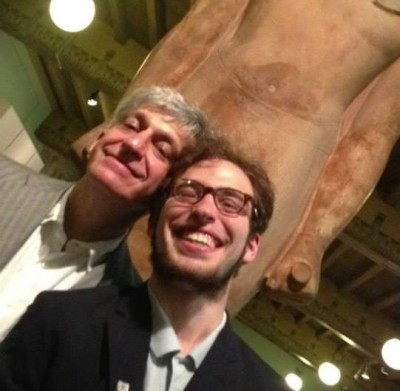
My father (z”l) died quite suddenly last month. He was young, 57, and had appeared so happy and so healthy. During his final hours, I got the call to come home. I went back to the States for the funeral and shiva.
It’s been tough. I was really close with my father – he was a great dad: emotionally supportive, caring, loving, and instructive; also, he was a genuinely wonderful person to be around. Until October he had been really healthy, and I had imagined that I would get to see him grow old. I miss him a lot.
And it’s hard to be far away from home right now. But perhaps easier.
Of course, it is hard to be away. My mother is in New York, and my sister in Baltimore, and most of my father’s friends are in the States. My father is also buried in the New York suburbs. When I mourn at the moment, it is hard to reconcile at times my distance from where my father is. A lot of the people who are supporting me are in New York, Chicago, and Washington, D.C.
Needless to say, my post-master’s plans are in flux right now. Originally, I was planning to stay abroad for a long time and come back only to visit. But now, with my mother mostly alone at home, although surrounded by lots of loving friends and some family, I am considering coming home to New York after this year to be with my mother. It might help. It might also not be such a good idea – New York very much reminds me of the grief right now in many different ways. We will see. It may also be comforting to be near my dad’s grave.
But there is a certain amount in which being far away has been easier. As I just mentioned, New York is now loaded with grief for me – and the weight of the memories may be too much to handle right now. Secondly, being away from New York has also given me – and my mother and sister – the space I (we) need to grieve and build the “new normal” that must inevitably follow. Finally, there is the gift of the supportive and loving community I have here.
The Oxford Jewish community has been incredible. Normally, there is no daily minyan – at a few hundred Jews, Oxford is simply not large enough to guarantee that, and certainly not with Orthodox counting practices. Yet friends and classmates have turned out every weekday evening since I have returned to form an egalitarian minyan in which I (and others) can recite kaddish! I have also been invited to meals and have had someone to talk to whenever necessary. In short, the community has turned out for me – and I am so very, very grateful.
The project of saying kaddish every day has given an opportunity to reflect on the valor of small communities. I have railed about New York’s bubble aspects before, but I also found the Jewish community there so large that it was easy to fall through the cracks. Mourners, yes, are supported – so were we – but shiva visits quickly, for many, become a chore or a formality. That is not to say they are not well-meant or genuine, but rather in such large communities it is often difficult to gain the same empathy or supportive feeling a small community might have. Furthermore, it is easier to go unnoticed. Though this fact is not good for everyone, admittedly, in a small community, when one person is going through something, a small act of support goes a longer way. As I have watched Oxford’s Jews help me, I have seen how much of a good impact these actions have had on my well-being. Would I necessarily have felt the same way in New York or even London?
My father was an Anglophile to his last moments, and being in England reminds me of him in so many small ways. Sometimes there are comforting material reminders, for example the omnipresence of toast and Marmite, or perhaps the ever-present sans-serif font my father admired. There is also the simple fact of being in a country my father genuinely loved, and in a twist of events could have emigrated to instead of the United States. Yet it is also hard as a result to be here – he loved the United States too, after all.
How does one grieve? Ecclesiastes teaches us that “to everything there is a season,” and this is a place where I am trying to start. Being far from home is hard, but I am also in a place where I am loved and supported. At the same time, going home remains a realistic option for me – especially in this modern age. The grief seems hard, but I know that I will be able to cross the bridge as necessary – and I feel so grateful that I can be here or there and feel loved and supported. And feel like Dad’s right here with me.
Jonathan P. Katz is a student at Oxford University in England.
![index [Public Domain], via Pixabay.](https://newvoices.org/wp-content/uploads/2014/12/index.jpg)
